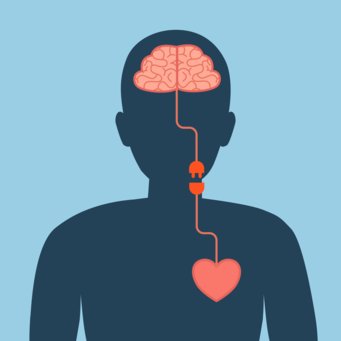Associations between mental health and blood pressure
New approaches for treating hypertension could focus on the interplay between mental and physical health
Our mental health and that of our cardiovascular system have a complex interaction. A recent study from the Max Planck Institute for Human Cognitive and Brain Sciences in Leipzig, Germany, now shows the links between higher blood pressure and depressive symptoms, well-being and emotion-related brain activity that may be relevant to the development of hypertension.

Several studies have already reported a link between mental health and hypertension, with mixed or even contradictory results. In their study, the researchers from the Max Planck Institute for Human Cognitive and Brain Sciences have now deeply analysed the relationship between mental health, higher blood pressure and hypertension, using extensive psychological, medical and imaging data from the elderly population. "To obtain statistically robust answers, we used the extremely large sample size of the UK Biobank with over 500,000 elderly study participants," reports Lina Schaare, first author of the study.
On the one hand, the researchers showed that higher systolic blood pressure is associated with fewer depressive symptoms, greater well-being and lower emotion-related brain activity. Systolic blood pressure refers to the pressure during the heartbeat, when the heart muscle contracts and pumps blood into the vessels. For a blood pressure of 120 to 80 mmHg, the first value (120) indicates the systolic blood pressure, the second value (80) the diastolic blood pressure, i.e. the pressure on the vessels when the heart muscle relaxes. On the other hand, the presence of a high blood pressure (hypertension) diagnosis was associated with more depressive symptoms and lower well-being. The researchers also found that the threat of high blood pressure is linked to poorer mental health, even years before hypertension is diagnosed.
Taken together, these findings - which at first appear to be contradictory - provide important clues about how psychological factors can complicate the treatment of hypertension. "In the clinic, we observe that those affected often feel tired and fatigued and then do not take their medication for the higher blood pressure because this additionally affects their mood," explains Arno Villringer, who heads the Department of Neurology at the Max Planck Institute and is the study's last author. "On the other hand, we suspect that in people who feel good mentally with temporarily higher blood pressure, reinforcement learning ultimately contributes to the development of permanent high blood pressure. This is because the pain threshold also increases with higher blood pressure. This applies not only to physical pain, but also to social pain or greater stress. So they endure the pain or stress and then ten years later are diagnosed with hypertension."
The researchers believe these findings lay the groundwork for new thinking about the link between mental health and the causes of hypertension. For the widespread diseases of depression and hypertension, such a change in perspective could enable new approaches to therapy and prevention that focus on the interaction of mental and physical health.












